Discover the perfect harmony of flavors with baked white fish adorned with a zesty lemon caper sauce. This culinary masterpiece combines the delicate texture of fresh fish with the vibrant tanginess of lemon and the briny depth of capers, creating a dish that’s as visually appealing as it is flavorful. Whether you’re a seasoned home cook or a food enthusiast, this recipe offers a simple yet sophisticated way to elevate your seafood meals. From the ideal fish varieties to complementary side dishes, this guide dives into the art of pairing fish with lemon caper sauce, ensuring every bite is a delightful experience. Explore the nuances of this timeless dish and uncover how it can become a staple in your culinary repertoire.
Key Takeaways
- Flavorful Fish Pairing: Baked white fish perfectly pairs with lemon caper sauce, enhancing its citrusy tang and umami depth.
- Caper Sauce Simplicity: Create a rich, aromatic sauce using just a few ingredients—butter, garlic, lemon zest, lemon juice, and capers.
- Fish Sauce Essentials: Achieve authentic Southeast Asian flavors with anchovy, salt, and water in your fish sauce.
- Versatile Condiment: Lemon caper sauce adds brightness to dishes, offering a zesty twist to elevate your meals.
- Culinary Flexibility: Craft custom variations of lemon caper sauce by experimenting with herbs and spices for unique taste profiles.
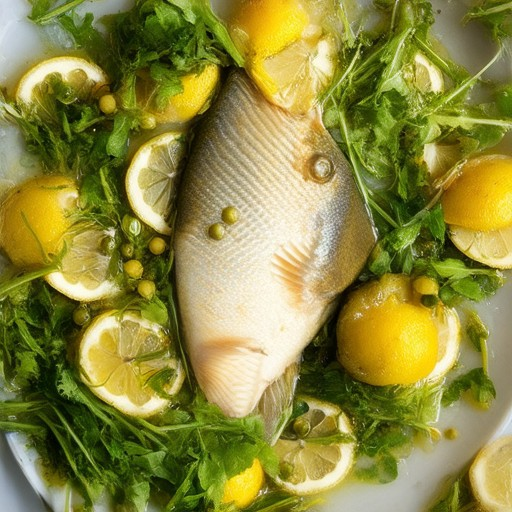
What Fish Goes Well with Lemon Caper Sauce?
Lemon caper sauce, with its tangy and slightly sweet flavor, pairs beautifully with a variety of fish. Here are some excellent options:
- Red Snapper : Known for its firm texture and mild flavor, red snapper is a great match for the brightness of lemon caper sauce.
- Hogfish : This sweet-tasting fish balances well with the acidity of lemon caper, creating a harmonious flavor profile.
- Mutton Snapper : Similar to red snapper, mutton snapper has a delicious flavor that complements the sauce’s zesty notes.
- Tripletail : A larger fish with a rich, buttery texture, tripletail works well with the tanginess of lemon caper sauce.
- Snook : A robust fish with a flaky texture, snook holds up well against the bold flavors of lemon caper sauce.
- Pompano : Known for its tender meat, pompano is a delightful choice that pairs nicely with the sauce’s complexity.
- Trout : For a lighter option, trout’s delicate flavor is enhanced by the bright acidity of lemon caper sauce.
- Wahoo : With its rich, oily texture, wahoo stands up well to the tangy sauce, balancing its fat with the sauce’s acidity.
- Sea Bass : A luxurious choice, sea bass’ buttery texture complements the sauce’s tanginess perfectly.
These fish varieties offer a range of textures and flavors, ensuring a satisfying experience when paired with lemon caper sauce. Whether you’re grilling, baking, or pan-searing, these options will elevate your dish to something extraordinary.
What Goes with Lemon Caper Sauce?
Lemon caper sauce adds a vibrant, tangy flavor to dishes, making it versatile for various culinary creations. Here’s a curated selection of ingredients and dishes that pair exceptionally well with lemon caper sauce:
Starters
- Caprese Salad: A classic starter featuring fresh mozzarella, tomatoes, and basil, drizzled with olive oil. The creaminess of mozzarella contrasts beautifully with the tangy lemon caper sauce.
Mains
- Pasta Dishes:
- Shrimp Pasta: Pair lemon caper sauce with sautéed shrimp for a refreshing twist, served over spaghetti or zucchini noodles.
- Salmon or Cod: The mild flavor of salmon or cod complements the brightness of lemon caper sauce, making it a delightful main course.
- Grilled Chicken: Marinate chicken in lemon juice and herbs, then grill until juicy. Drizzle lemon caper sauce for a flavorful finish.
- Vegetable Stir-Fries: Add lemon caper sauce to stir-fried zucchini, bell peppers, and snap peas for a healthy and zesty meal.
Sides
- Garlic Bread: A classic choice that absorbs the tangy sauce, perfect for mopping up every last drop.
- Mixed Green Salad: Enhance the salad with a lemon vinaigrette made from the sauce itself, adding depth and freshness to your greens.
- Mashed Potatoes: Mix in a tablespoon of lemon caper sauce for a creamy, tangy twist on traditional mashed potatoes.
Vegetarian Options
- Grilled Vegetables: Serve roasted eggplant, zucchini, and bell peppers with lemon caper sauce for a satisfying vegetarian meal.
- Halloumi Salad: Combine grilled halloumi with arugula, cherry tomatoes, and lemon caper dressing for a nutritious and flavorful salad.
Bonus Tips
- Add lemon zest and freshly chopped parsley for a burst of color and extra zesty flavor.
- Pair with a crisp white wine like Pinot Grigio or Sauvignon Blanc to complement the acidity of the sauce.
This combination of ingredients creates a balanced and flavorful meal, showcasing the versatility of lemon caper sauce across various courses.
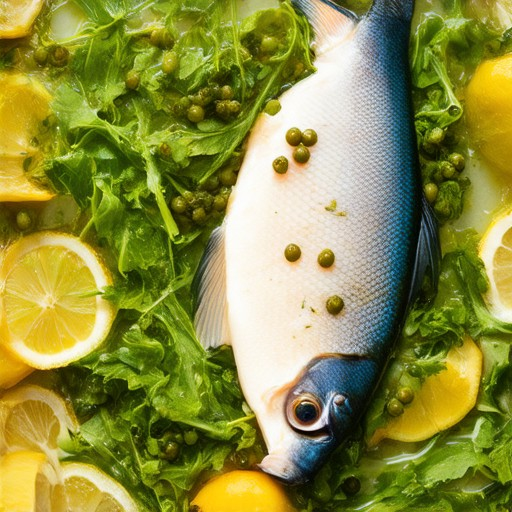
Are Capers Good with Fish?
Capers are indeed excellent when paired with fish, offering a unique briny and acidic flavor that complements various types of seafood. Their versatility allows them to enhance both mild and hearty fish dishes, making them a valuable ingredient in countless recipes.
Why Capers Are Great with Fish
- Flavor Profile : Capers add a tangy, slightly bitter note to dishes, which helps balance the richness of fatty fish like salmon and mackerel.
- Complementary Ingredients : They work well with lemon, herbs, and creamy sauces, making them a versatile addition to both simple and elaborate fish recipes.
Fish That Pair Well with Capers
- Salmon : The mild flavor of salmon benefits from the bright acidity capers bring, creating a refreshing taste.
- Mackerel : Known for its earthy taste, mackerel pairs beautifully with capers, enhancing its umami notes.
- Swordfish : Its firm texture contrasts nicely with the brine of capers, adding a satisfying mouthfeel.
Cooking Ideas with Capers
- Lemon Butter Sauce : A classic combination, perfect for white fish like cod or halibut.
- Citrus-Herb Marinade : Mix capers with lemon juice, olive oil, and herbs for a zesty marinade.
- Creamy Sauce : Incorporate capers into a béchamel or Alfredo-style sauce for a tangy twist.
By incorporating capers into your fish dishes, you can elevate your meals with their distinctive flavor. Whether you’re looking for a quick weeknight dinner or a gourmet dish, capers are a fantastic addition to any seafood recipe.
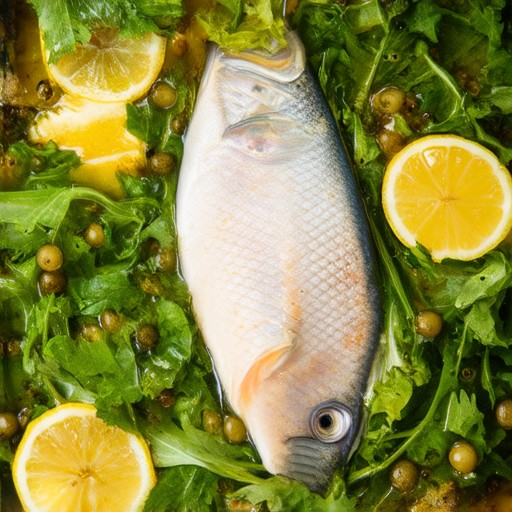
How to Make Caper Sauce for Fish
To create a flavorful caper sauce for fish, follow these simple steps:
- Ingredients:
- 4 tablespoons unsalted butter
- 1 small clove garlic, minced
- 1 teaspoon lemon zest
- 2 tablespoons freshly squeezed lemon juice
- 2 teaspoons capers, drained
- Optional: finely chopped parsley, red onion, or shallots
- Instructions:
- Melt 4 tablespoons of unsalted butter in a small skillet over low heat.
- Add minced garlic and sauté for 1-2 minutes until fragrant.
- Stir in 1 teaspoon lemon zest and 2 tablespoons of lemon juice, mixing well.
- Add 2 teaspoons of capers and optional herbs or vegetables, then bring the mixture to a gentle simmer.
- Simmer for about 30 seconds to allow flavors to meld.
- For a smoother texture, blend the mixture before serving.
- Tips:
- Adjust seasoning with salt and pepper to taste.
- For a dairy-free version, substitute olive oil for butter.
- Consider substituting pickles or olives for capers if unavailable.
Drizzle the caper sauce over your favorite fish dishes for a bright, tangy flavor. Enjoy!
What is Lemon Caper Sauce Made Of?
Lemon caper sauce is crafted through a meticulous process involving fermented capers and fresh lemon ingredients. Here’s a breakdown:
- Fermented Capers : The foundation of caper sauce begins with fermented capers, sourced from the flower buds of the caper plant. These are typically submerged in a brine solution to initiate fermentation, allowing the natural conversion of sugars into alcohol and acids, contributing to the tangy flavor.
- Pasteurization : After fermentation, the mixture undergoes pasteurization to eliminate harmful bacteria, ensuring safety and extending shelf life.
- Processing : Fermented capers are rinsed and dried, often through natural air drying or mechanical methods, before being ground into a paste.
- Blending : The caper paste is then combined with olive oil, garlic, and herbs. Fresh lemon juice is added to enhance acidity, while sugar or honey may be used to balance the tartness. Vinegar is sometimes incorporated for additional acidity.
- Variations : Different producers offer twists, incorporating ingredients like shallots, chives, or spices, leading to diverse flavor profiles. Consistency can vary, with some sauces being thin or thick based on preferences.
This blend of fermented capers, lemon, and complementary ingredients creates a versatile condiment valued in culinary applications.
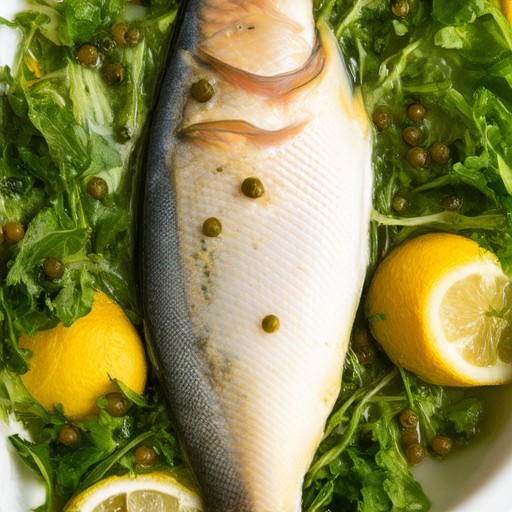
What Three Ingredients Should Fish Sauce Contain?
- Anchovies
- Salt
- Water
The primary ingredients in Southeast Asian fish sauce typically include anchovies, salt, and water. These components work together to create the distinctive umami flavor that fish sauce is known for.

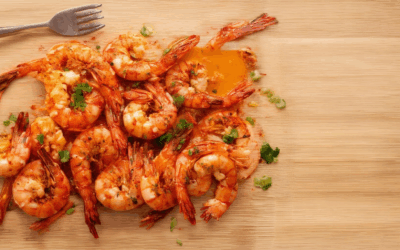
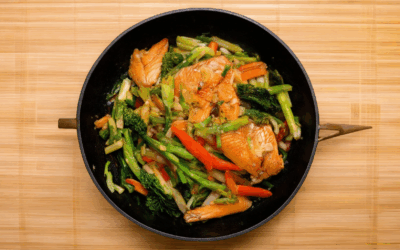
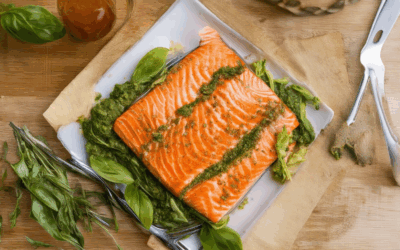
0 Comments